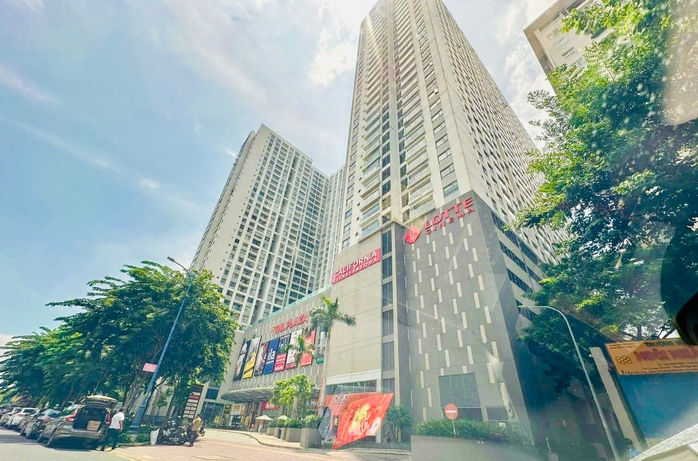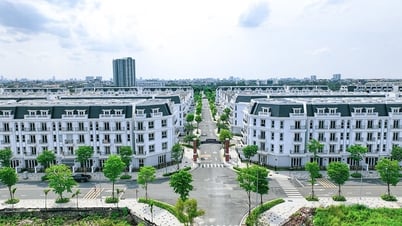In a recent report to the National Assembly, the Ministry of Finance proposed a new plan on personal income tax (PIT) for real estate transfers: taxing 20% on the profit (selling price minus purchase price and legal expenses) in addition to the current plan of collecting 2% on the total transfer price. The goal is to increase fairness and transparency in tax management, while limiting speculation and price increases. However, many people are wondering whether this policy will actually hit speculators or unintentionally increase house prices, affecting real buyers.
Anti-speculation tax?
Master - Lawyer Nguyen Phuong Lien, SENLAW Law Firm, believes that the 20% tax plan is close to international practice and reflects the principle of levying on actual income, helping to increase budget revenue and limit tax losses. However, the big challenge is enforcement capacity, because many real estate transactions currently lack complete data on purchase prices, especially for long-term assets, inherited real estate, donated real estate or hand-written purchases. The valuation and information management systems are not yet synchronized, making it difficult to determine profits and easy to argue.
Options for personal income tax in real estate transactions are still controversial from many sides.
In addition, if not calculating reasonable costs such as interest, renovation costs, inflation factors, sellers may increase prices to compensate for taxes, unintentionally pushing up home prices.
Many experts agree that profit-based tax is reasonable and fair, reflecting the true nature of income instead of revenue. However, to implement it, there needs to be detailed guidance on deductible expenses, including interest, legal fees, repairs and depreciation factors for long-term owned real estate. Master - lawyer Lien emphasized that the real estate market is currently sluggish. If the new tax is applied without synchronizing legal infrastructure and data, liquidity may decrease, and house prices may increase because sellers include tax costs in the selling price. This will make it more difficult for real buyers to access housing.
Some intermediate solutions are being proposed such as: flexibly applying two options depending on the ability to prove the original price of the transaction; exempting or applying preferential taxes on social housing and low-cost housing; and gradually converting from lump-sum tax to tax on profits according to a specific roadmap. However, the big challenge is how to force people to honestly declare expenses, while preventing the situation of false declaration to reduce tax obligations without effective inspection tools and a complete legal framework.
Consider two options
Ms. Ngoc Mai (Binh Tan District, Ho Chi Minh City), who owns many real estate properties, said that with stable finances and the need to invest in leasing, she chose the 2% tax option because it is quick and does not require detailed declaration. Meanwhile, as a real estate investor, Mr. Bui Thanh Long (District 7, Ho Chi Minh City), chose the 20% tax option because he could calculate actual profits and losses.
Mr. Tran Khanh Quang, Director of Viet An Hoa Real Estate Company, commented that the current 2% tax rate is somewhat "uniform". When the market is bustling, sellers make a lot of profit, they do not object, but when the market is down, sellers still have to pay a 2% tax, which is very unreasonable. Especially with large-value real estate, the damage is even more obvious. He gave an example, a person who buys a 100 billion VND real estate but after a year only sells 105 billion VND, just enough to pay debt or turn around capital, still has to pay 2% tax (2.1 billion VND), not to mention interest, notary fees, brokerage fees... leading to a loss. If a 20% tax is applied on profits, in this case, the seller almost does not have to pay tax. According to Mr. Quang, allowing people to choose between the two options is reasonable and flexible, depending on each specific case.
Mr. Nguyen Tan Phong, Director of the Legal Consulting Center (Vietnam E-commerce Association), agrees with the direction of taxing based on profits to reflect actual income. However, to be feasible and fair, it is necessary to maintain two options in parallel. The 20% option should be applied when people have complete documents proving expenses; the 2% option is applied when the cost price cannot be determined. This helps limit risks for transactions related to long-term owned assets, gifts, inheritances, etc. "Tax is not only an obligation, but also a sign of fairness. For the policy to be effective, there needs to be specific, unified guidance nationwide, avoiding the situation where each locality applies it differently, causing difficulties for people" - Mr. Phong emphasized.
Master - Lawyer Nguyen Phuong Lien also said that the proposal to impose a 20% tax is appropriate in principle. However, it needs to be carefully considered in the context of the lack of uniformity and transparency in the price and cost data system. The State needs to soon issue a clear legal framework and complete the database for effective implementation.
Dr. TRAN QUANG THANG, Director of the Ho Chi Minh City Institute of Economics and Management: Progressive taxation or tax by area
The application of the second property tax with these two options can create many impacts on the market, including: If the tax rate is too high, the second property owner may reduce the incentive to invest, especially in the rental or long-term investment sector. Investors may switch to other assets such as gold, stocks instead of real estate. If the tax is levied on the transfer price (2%), this may cause house prices to increase because sellers will adjust the selling price to compensate for the tax. If the tax is based on profits (20%), house prices may not be directly affected but investors may calculate more carefully before buying and selling. Owners may hold the property longer to avoid tax instead of buying and selling continuously. There is a possibility of tax evasion such as trading through intermediaries or adjusting profits to reduce the amount of tax payable.
In my opinion, there are a number of other tax options that can be considered to ensure fairness and promote sustainable development of the real estate market, such as: Progressive tax based on the number of real estates owned; tax based on area or property value; tax on short-term real estate transactions; tax based on benefits arising from infrastructure.
Source: https://nld.com.vn/dau-dau-tinh-toan-thue-bat-dong-san-196250602211918051.htm




![[Photo] Prime Minister Pham Minh Chinh attends a special art program called "Hanoi - From the historic autumn of 1945"](https://vphoto.vietnam.vn/thumb/1200x675/vietnam/resource/IMAGE/2025/8/15/c1c42655275c40d1be461fee0fd132f3)



















![[Photo] Prime Minister Pham Minh Chinh talks on the phone with Cambodian Prime Minister Hun Manet](https://vphoto.vietnam.vn/thumb/1200x675/vietnam/resource/IMAGE/2025/8/15/72d3838db8154bafabdadc0a5165677f)

![[Photo] Firmly marching under the military flag: Ready for the big festival](https://vphoto.vietnam.vn/thumb/1200x675/vietnam/resource/IMAGE/2025/8/15/86df2fb3199343e0b16b178d53f841ec)

![[Photo] The special solidarity relationship between Vietnam and Cuba](https://vphoto.vietnam.vn/thumb/1200x675/vietnam/resource/IMAGE/2025/8/15/5f06c789ab1647c384ccb78b222ad18e)


![[Photo] Binh Khanh Bridge Ho Chi Minh City is ready to reach the finish line](https://vphoto.vietnam.vn/thumb/1200x675/vietnam/resource/IMAGE/2025/8/14/b0dcfb8ba9374bd9bc29f26e6814cee2)
































![[Photo] President Luong Cuong receives Finnish Ambassador to Vietnam Keijo Norvanto](https://vphoto.vietnam.vn/thumb/402x226/vietnam/resource/IMAGE/2025/8/15/9787f940853c45d39e9d26b6d6827710)




































Comment (0)